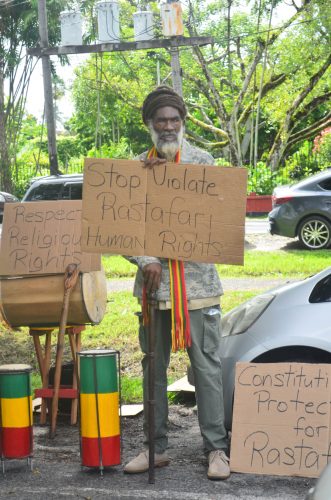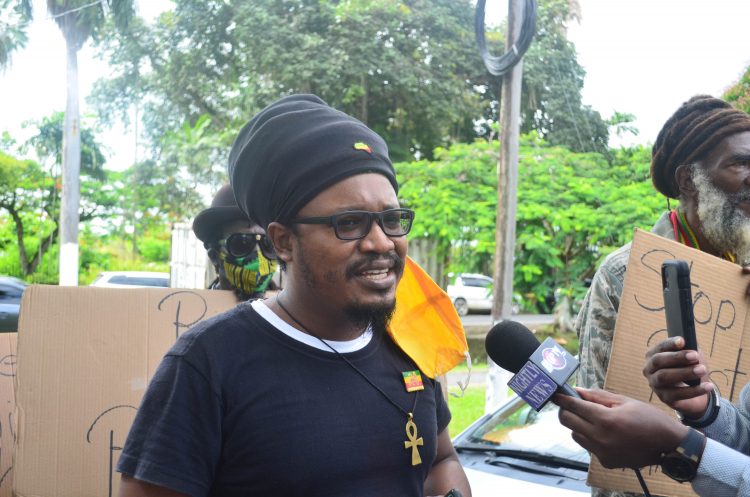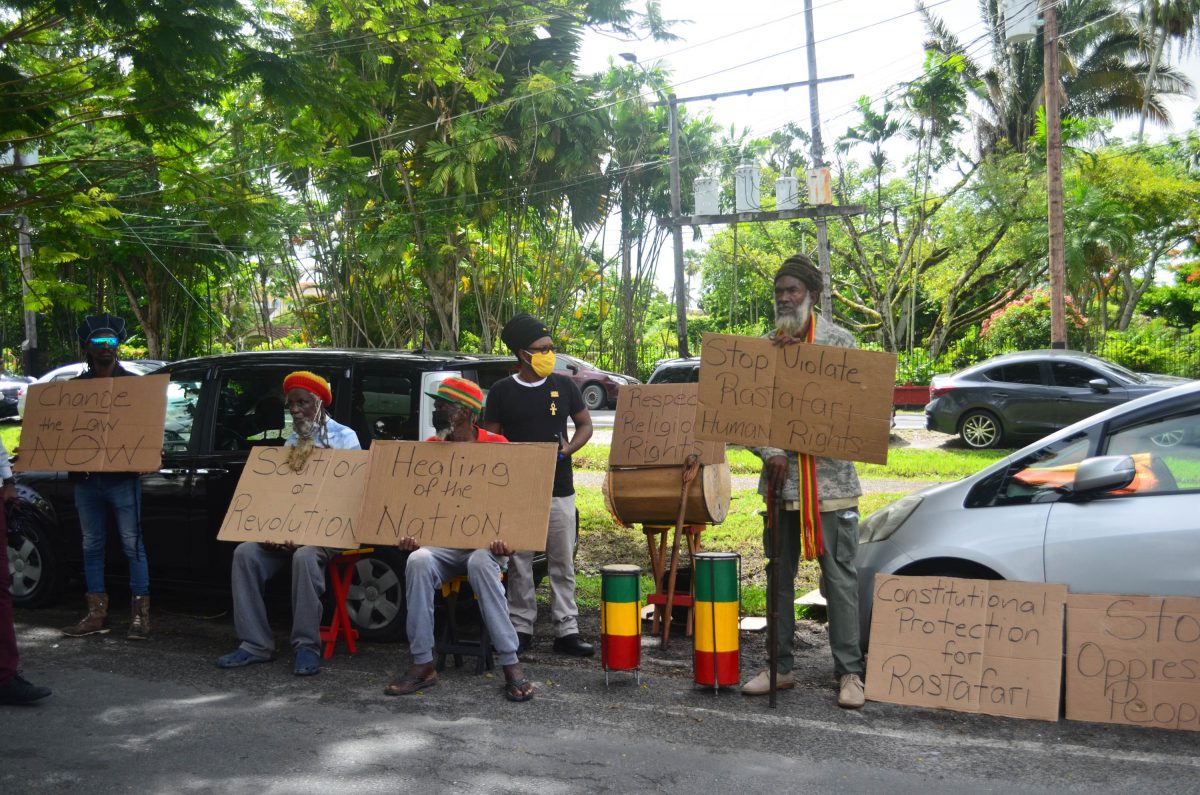Faced with a renewed protest by members of the Rastafarian community for movement on the removal of custodial sentences for the possession of small amounts of marijuana, Attorney General Anil Nandlall yesterday urged patience.
The Guyana Rastafari Council, House of Nyahbinghi and the 12 Tribes of Israel on Friday morning held a peaceful protest to call out the government on its delay in addressing the law, following the recent raid done at the house of the Council’s former president Ras Leon Saul, who was held on Wednesday and taken into custody at the Timehri Police Station for the possession of marijuana.
The protest was held outside of the Chambers of the Attorney General, where the parties stood peacefully displaying placards highlighting their concerns.

Current president of the Guyana Rastafari Council Ras Simeon told reporters that the Council views the continued criminalization of the possession of small amounts of cannabis as being responsible for the continued violation of their human rights.
Against this background, he called on Nandlall to help stop the legal system’s oppression of Rastafarians, whom he noted are being jailed, while their families are being destroyed. He reiterated that no one should go to prison for use of cannabis, which he said has been misclassified as a drug when in fact it is an herb and medication.
The man noted that government officials promised to meet and discuss the matter but have not done so. He noted that according to information received, a Special Select Committee was established to address the issue at hand but the Rastafarian community was not consulted on

participation.
Nandlall yesterday acknowledged that the Council’s opportunity for lobbying for the removal of custodial sentences for the possession of small amounts of cannabis has been delayed, as the Parliamentary Select Committee to look at the proposed amendment to the law has not yet had the chance to meet.
“The bill was laid, it has been fully debated in the National Assembly. Because there was some controversy in relation to the quantum that would not carry a custodial sentence…it was sent to a Select Committee. At the Committee, we intend to hear the views of stakeholders and take them into account. I don’t think that a protest was necessary, and I dare say it was premature,” Nandlall told the Stabroek News yesterday.
“It is our policy, as far as possible, to acheive consensus on almost everything that we do, including our legislation. Since this was a narrow issue we believed we could get consensus on, at a Select level, after hearing the views of stakeholders and the opposition, we decided to transmit the bill to a select Committee. Unfortunately, because of COVID the parliament has not been functioning in its full capacity. That committee was unable to meet,” he added.
Nandlall explained that he was unable to meet with the protestors yesterday as he spent most of his morning at a meeting with President Irfaan Ali and only upon his return did he learn that there had been a protest outside his office.
General Secretary of the Guyana Rastafari Council Ras Khafra, who also spoke with the media outside of the Attorney General’s Chambers, reminded yesterday that the Council has been lobbying for the law to be changed for some time.
He said while promises were made, nothing tangible was achieved. The man stated that it was observed that many persons were recently charged for small amounts of marijuana and further made mention of the case of Saul.
He said the council is trying to accommodate the government by giving it the opportunity to respond.
He maintained that they will continue to fight until something is done about the situation.
He said it is injustice for someone to be jailed for small amount of marijuana “especially in the context where the perceptions and attitudes toward cannabis have changed.”
The protest will continue on Monday at 9am.
In late January, after voting down an APNU+AFC motion proposing an amendment to allow possession of up to 500 grammes of cannabis without a custodial penalty, the PPP/C tabled its proposed amendment.
Nandlall had said the proposed bill, the Narcotic Drugs and Psychotropic Substances (Control) (Amendment) Bill 2021, was intended to eliminate custodial sentences for possession of less than 30 grammes of cannabis.
The bill states that it aims to reduce recidivism, prison overcrowding and the burden on the criminal justice system, save state funds, and ultimately rebuild lives, families and communities affected and disadvantaged by the fining and incarceration of persons, especially youths, for possession and use of small amounts of cannabis.
Nandlall had pointed to the fact that the coalition had been in office from 2015 to 2020 but had failed to pass the amendments.
The coalition had said that the inactivity of the National Assembly in 2019 due to the passage of the no-confidence motion on December 21, 2018 prevented MPs from the Alliance for Change (AFC) segment of the governing coalition from being able to successfully pilot the amendment of the Narcotic Drugs and Psychotropic Substances (Control) Amendment Bill.
According to the Explanatory Memorandum of Nandlall’s bill, under the new subsection (2A) the possession of a quantity of cannabis or any substance held out to be cannabis which does not exceed fifteen grammes would be punishable by mandatory counselling for a period to be determined by the counsellor. Under (2B) the possession of any quantity of cannabis or any substance held out to be cannabis which exceeds fifteen grammes but does not exceed thirty grammes would be punishable by community service which includes employment in a public work under the Extra-Mural Work Act, for a period not exceeding six months.
Clause five seeks to amends section 5(2)(e) to increase the quantity of cannabis, in relation to the burden of proof being placed on a person to prove that the person is not in possession of cannabis for the purpose of trafficking, from more than fifteen grams to more than thirty grammes.
Clause six seems to amends section 12 to remove the fine and term of imprisonment for the smoking, inhaling, sniffing, or otherwise using cannabis, being found in a place used for that purpose, or being the owner, occupier, or concerned in the management of any place used for preparation of cannabis for that purpose. The amendment also seeks to remove the penalty for the possession of any pipe or other utensil used in connection with the smoking, inhaling or sniffing or otherwise using of cannabis.
These offences would be punishable by community service for a period not exceeding six months. In addition, the offence of handling any package, container or other thing which contains a quantity of cannabis not exceeding fifteen grammes, would be punishable by mandatory counselling for a period determined by the counsellor.






